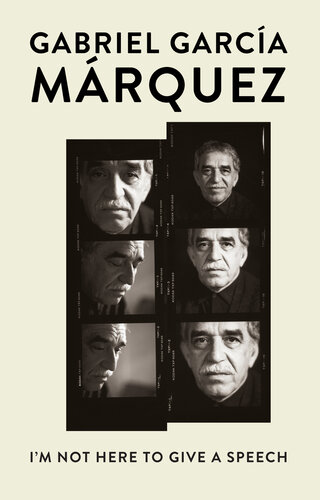
I'm Not Here to Give a Speech
Vintage International
کتاب های مرتبط
- اطلاعات
- نقد و بررسی
- دیدگاه کاربران
نقد و بررسی

November 5, 2018
Though the late Nobel laureate García Márquez (1927–2014) professed discomfort with public speaking, as the title indicates, this collection demonstrates that he was still a powerful storyteller with the spoken as well as printed word. The talks are arranged chronologically, from a farewell address in praise of friendship he gave at age 17 in 1944 to his classmates at the National Secondary School for Boys in Zipaquirá, Colombia, to a 2007 speech on writing One Hundred Years of Solitude to Real Academia Española and the king and queen of Spain. In the latter, he marvels at the millions of readers the book has touched, not to boast but “to show that there are a number of human beings who have demonstrated with their habit of reading that their souls are open to be filled with messages in Spanish.” Perhaps the most notable selection is his 1982 speech accepting the Nobel Prize, “The Solitude of Latin America,” which counsels Europeans “with an enlightening spirit” to realize that expressing solidarity with Latin Americans’ “dreams will not make us feel less alone” unless accompanied by concrete action. These talks, so eloquently rendered by García Márquez’s longtime translator Grossman, capture the novelist’s passion, genius, and energetic way of telling a story with a clear moral.

November 1, 2018
A set of speeches given over the course of his long literary career offers snapshots of the Colombian author's uniquely eloquent humanitarian voice and vision.García Márquez (1927-2014), the author of such classics as One Hundred Years of Solitude and Love in the Time of Cholera and winner of the 1982 Nobel Prize for Literature, was a passionate advocate for his Latin American culture and identity. In his Nobel speech, "The Solitude of Latin American," he expresses his heartfelt hope that the Swedish Academy was ultimately recognizing through his work the underappreciated richness of the Latin American imagination, "because the greatest challenge for us has been the insufficiency of conventional devices to make our lives believable." His idealistic vision of cultural rapprochement shines through many of these speeches, as he offers a plea for the convergence of sciences and arts ("for the questioning of both is the same over the same abyss") and the significant role of the intellectual in society. Throughout his life, García Márquez was a fierce activist for social change. In "The Cataclysm of Damocles" (1986), he laments that in the nuclear age, the only reason we have not annihilated ourselves in a cosmic disaster is that "the preservation of human life on Earth continues to be cheaper than the nuclear plague. In "The Beloved Though Distant Homeland" (2003), delivered in Medellin, he rues Colombia's devastating proliferation of narco-violence. Friendship forms the theme of two of the most affecting speeches, in which he celebrates the work of Álvaro Mutis (1993) and Julio Cortázar. Elsewhere, García Márquez reveals his deep roots in poetry and journalism. Regarding the latter, during a 1996 speech in Los Angeles, he presciently noted that the discipline was dangerously veering into a terrain of "innocent or deliberate mistakes, vicious manipulations, and venomous misrepresentations that give the news article the dimensions of a deadly weapon."Essential truths in the rare and generous voice of a maestro.
COPYRIGHT(2018) Kirkus Reviews, ALL RIGHTS RESERVED.

December 1, 2018
Nobel laureate Márquez (One Hundred Years of Solitude; Love in the Time of Cholera) was nearly as good at speechifying as writing novels. A natural storyteller, he was gifted with the ability to reframe ordinary words into phrases of wonder. Gems of this nature are scattered throughout this collection, which begins with a speech Márquez gave to his secondary school classmates at age 17. Márquez never shied away from denouncing folly or evil. His eloquent 1982 Nobel Prize acceptance speech attacks the way Latin America's promise has been ignored, wasted, and perverted by Western indifference, an idea he repeats in subsequent addresses. There is repetition (though not in the language used) because Márquez had one central theme: we were risking the future if we continued on the path chosen. Another recurrent motif is the power of poetry to realize our essential humanity. Marquez's impish sense of humor surfaces in seriocomic eulogies to writers and friends Julio Cortázar, former Colombian president-poet Belisario Betancur, and poet Álvaro Mutis. VERDICT For Márquez devotees and all serious lovers of literature.--David Keymer, Cleveland
Copyright 2018 Library Journal, LLC Used with permission.

























دیدگاه کاربران